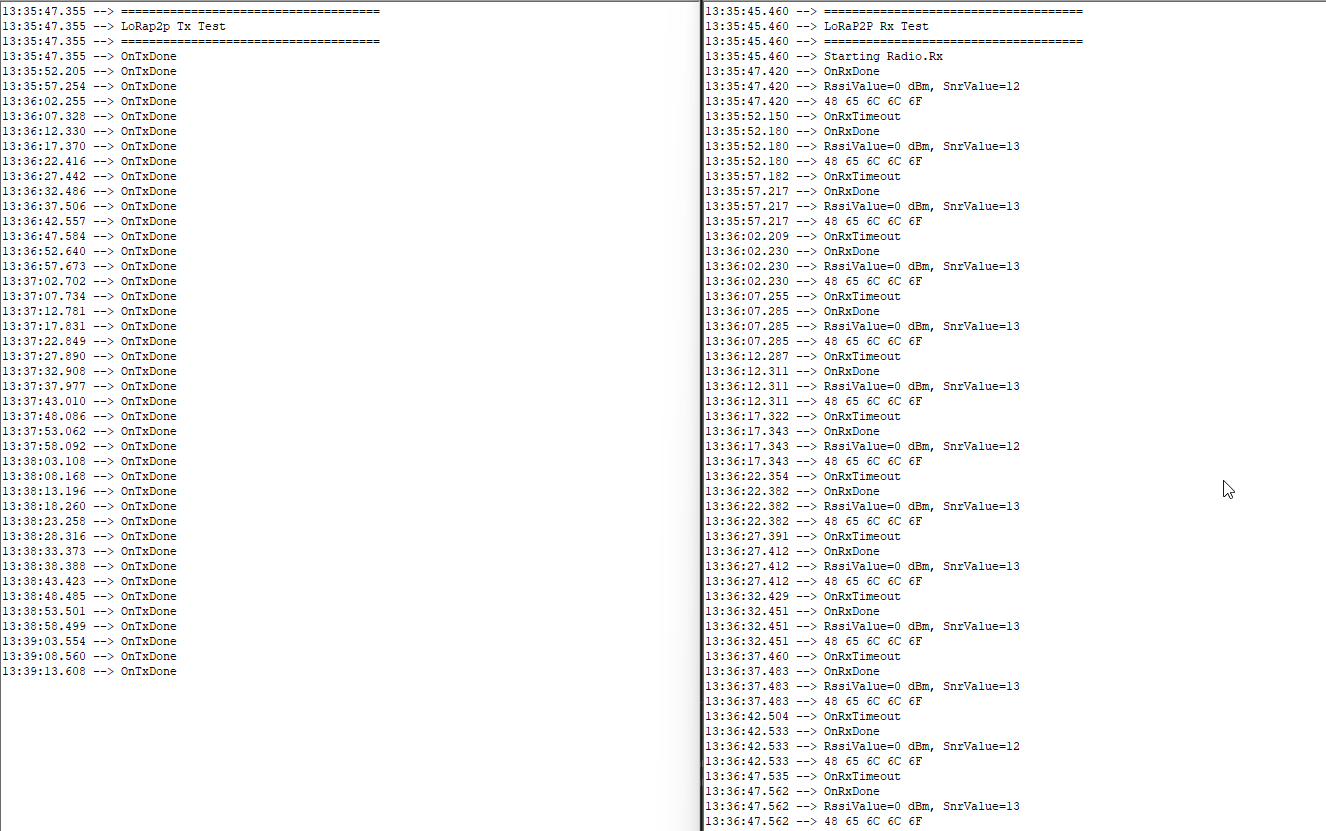Hi,
Thank you, and thank you for the reply.
So i have tried both the one in the documentation centre, and also the on inside the Arduino IDE, the examples that can be opened there: Lora P2P Tx and Rx examples.
Online source:
The version from examples (tx):
/**
* @file LoRaP2P_TX.ino
* @author rakwireless.com
* @brief Transmitter node for LoRa point to point communication
* @version 0.1
* @date 2020-08-21
*
* @copyright Copyright (c) 2020
*
* @note RAK4631 GPIO mapping to nRF52840 GPIO ports
RAK4631 <-> nRF52840
WB_IO1 <-> P0.17 (GPIO 17)
WB_IO2 <-> P1.02 (GPIO 34)
WB_IO3 <-> P0.21 (GPIO 21)
WB_IO4 <-> P0.04 (GPIO 4)
WB_IO5 <-> P0.09 (GPIO 9)
WB_IO6 <-> P0.10 (GPIO 10)
WB_SW1 <-> P0.01 (GPIO 1)
WB_A0 <-> P0.04/AIN2 (AnalogIn A2)
WB_A1 <-> P0.31/AIN7 (AnalogIn A7)
*/
#include <Arduino.h>
#include <SX126x-RAK4630.h> //http://librarymanager/All#SX126x
#include <SPI.h>
// Function declarations
void OnTxDone(void);
void OnTxTimeout(void);
#ifdef NRF52_SERIES
#define LED_BUILTIN 35
#endif
// Define LoRa parameters
#define RF_FREQUENCY 868300000 // Hz
#define TX_OUTPUT_POWER 22 // dBm
#define LORA_BANDWIDTH 0 // [0: 125 kHz, 1: 250 kHz, 2: 500 kHz, 3: Reserved]
#define LORA_SPREADING_FACTOR 7 // [SF7..SF12]
#define LORA_CODINGRATE 1 // [1: 4/5, 2: 4/6, 3: 4/7, 4: 4/8]
#define LORA_PREAMBLE_LENGTH 8 // Same for Tx and Rx
#define LORA_SYMBOL_TIMEOUT 0 // Symbols
#define LORA_FIX_LENGTH_PAYLOAD_ON false
#define LORA_IQ_INVERSION_ON false
#define RX_TIMEOUT_VALUE 3000
#define TX_TIMEOUT_VALUE 3000
static RadioEvents_t RadioEvents;
static uint8_t TxdBuffer[64];
void setup()
{
// Initialize Serial for debug output
time_t timeout = millis();
Serial.begin(115200);
while (!Serial)
{
if ((millis() - timeout) < 5000)
{
delay(100);
}
else
{
break;
}
}
Serial.println("=====================================");
Serial.println("LoRap2p Tx Test");
Serial.println("=====================================");
// Initialize LoRa chip.
lora_rak4630_init();
// Initialize the Radio callbacks
RadioEvents.TxDone = OnTxDone;
RadioEvents.RxDone = NULL;
RadioEvents.TxTimeout = OnTxTimeout;
RadioEvents.RxTimeout = NULL;
RadioEvents.RxError = NULL;
RadioEvents.CadDone = NULL;
// Initialize the Radio
Radio.Init(&RadioEvents);
// Set Radio channel
Radio.SetChannel(RF_FREQUENCY);
// Set Radio TX configuration
Radio.SetTxConfig(MODEM_LORA, TX_OUTPUT_POWER, 0, LORA_BANDWIDTH,
LORA_SPREADING_FACTOR, LORA_CODINGRATE,
LORA_PREAMBLE_LENGTH, LORA_FIX_LENGTH_PAYLOAD_ON,
true, 0, 0, LORA_IQ_INVERSION_ON, TX_TIMEOUT_VALUE);
send();
}
void loop()
{
// Put your application tasks here, like reading of sensors,
// Controlling actuators and/or other functions.
}
/**@brief Function to be executed on Radio Tx Done event
*/
void OnTxDone(void)
{
Serial.println("OnTxDone");
delay(5000);
send();
}
/**@brief Function to be executed on Radio Tx Timeout event
*/
void OnTxTimeout(void)
{
Serial.println("OnTxTimeout");
}
void send()
{
TxdBuffer[0] = 'H';
TxdBuffer[1] = 'e';
TxdBuffer[2] = 'l';
TxdBuffer[3] = 'l';
TxdBuffer[4] = 'o';
Radio.Send(TxdBuffer, 5);
}
The version from examples (rx):
/**
* @file LoRaP2P_RX.ino
* @author rakwireless.com
* @brief Receiver node for LoRa point to point communication
* @version 0.1
* @date 2020-08-21
*
* @copyright Copyright (c) 2020
*
* @note RAK4631 GPIO mapping to nRF52840 GPIO ports
RAK4631 <-> nRF52840
WB_IO1 <-> P0.17 (GPIO 17)
WB_IO2 <-> P1.02 (GPIO 34)
WB_IO3 <-> P0.21 (GPIO 21)
WB_IO4 <-> P0.04 (GPIO 4)
WB_IO5 <-> P0.09 (GPIO 9)
WB_IO6 <-> P0.10 (GPIO 10)
WB_SW1 <-> P0.01 (GPIO 1)
WB_A0 <-> P0.04/AIN2 (AnalogIn A2)
WB_A1 <-> P0.31/AIN7 (AnalogIn A7)
*/
#include <Arduino.h>
#include <SX126x-RAK4630.h> //http://librarymanager/All#SX126x
#include <SPI.h>
// Function declarations
void OnRxDone(uint8_t *payload, uint16_t size, int16_t rssi, int8_t snr);
void OnRxTimeout(void);
void OnRxError(void);
#ifdef NRF52_SERIES
#define LED_BUILTIN 35
#endif
// Define LoRa parameters
#define RF_FREQUENCY 868300000 // Hz
#define TX_OUTPUT_POWER 22 // dBm
#define LORA_BANDWIDTH 0 // [0: 125 kHz, 1: 250 kHz, 2: 500 kHz, 3: Reserved]
#define LORA_SPREADING_FACTOR 7 // [SF7..SF12]
#define LORA_CODINGRATE 1 // [1: 4/5, 2: 4/6, 3: 4/7, 4: 4/8]
#define LORA_PREAMBLE_LENGTH 8 // Same for Tx and Rx
#define LORA_SYMBOL_TIMEOUT 0 // Symbols
#define LORA_FIX_LENGTH_PAYLOAD_ON false
#define LORA_IQ_INVERSION_ON false
#define RX_TIMEOUT_VALUE 3000
#define TX_TIMEOUT_VALUE 3000
static RadioEvents_t RadioEvents;
static uint8_t RcvBuffer[64];
void setup()
{
// Initialize Serial for debug output
time_t timeout = millis();
Serial.begin(115200);
while (!Serial)
{
if ((millis() - timeout) < 5000)
{
delay(100);
}
else
{
break;
}
}
Serial.println("=====================================");
Serial.println("LoRaP2P Rx Test");
Serial.println("=====================================");
// Initialize LoRa chip.
lora_rak4630_init();
// Initialize the Radio callbacks
RadioEvents.TxDone = NULL;
RadioEvents.RxDone = OnRxDone;
RadioEvents.TxTimeout = NULL;
RadioEvents.RxTimeout = OnRxTimeout;
RadioEvents.RxError = OnRxError;
RadioEvents.CadDone = NULL;
// Initialize the Radio
Radio.Init(&RadioEvents);
// Set Radio channel
Radio.SetChannel(RF_FREQUENCY);
// Set Radio RX configuration
Radio.SetRxConfig(MODEM_LORA, LORA_BANDWIDTH, LORA_SPREADING_FACTOR,
LORA_CODINGRATE, 0, LORA_PREAMBLE_LENGTH,
LORA_SYMBOL_TIMEOUT, LORA_FIX_LENGTH_PAYLOAD_ON,
0, true, 0, 0, LORA_IQ_INVERSION_ON, true);
// Start LoRa
Serial.println("Starting Radio.Rx");
Radio.Rx(RX_TIMEOUT_VALUE);
}
void loop()
{
// Put your application tasks here, like reading of sensors,
// Controlling actuators and/or other functions.
}
/**@brief Function to be executed on Radio Rx Done event
*/
void OnRxDone(uint8_t *payload, uint16_t size, int16_t rssi, int8_t snr)
{
Serial.println("OnRxDone");
delay(10);
memcpy(RcvBuffer, payload, size);
Serial.printf("RssiValue=%d dBm, SnrValue=%d\n", rssi, snr);
for (int idx = 0; idx < size; idx++)
{
Serial.printf("%02X ", RcvBuffer[idx]);
}
Serial.println("");
Radio.Rx(RX_TIMEOUT_VALUE);
}
/**@brief Function to be executed on Radio Rx Timeout event
*/
void OnRxTimeout(void)
{
Serial.println("OnRxTimeout");
Radio.Rx(RX_TIMEOUT_VALUE);
}
/**@brief Function to be executed on Radio Rx Error event
*/
void OnRxError(void)
{
Serial.println("OnRxError");
Radio.Rx(RX_TIMEOUT_VALUE);
}
Thanks.
